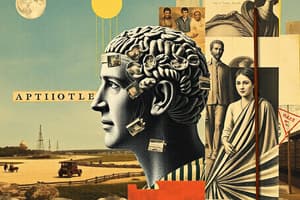Podcast
Questions and Answers
What is the faculty that steers towards the domain of life-sustaining pleasures like food, drink, and sex?
What is the faculty that steers towards the domain of life-sustaining pleasures like food, drink, and sex?
Appetite
Which of the following are examples of objects of touch corresponding to certain appetites?
Which of the following are examples of objects of touch corresponding to certain appetites?
- Dry things (correct)
- Hot things (correct)
- Cold things (correct)
- Moist things (correct)
Sight has a higher ability to distinguish objects compared to touch.
Sight has a higher ability to distinguish objects compared to touch.
True (A)
What is the rational desire involving a sense of time and a focus on achieving happiness?
What is the rational desire involving a sense of time and a focus on achieving happiness?
Match the following types of thinking with their descriptions:
Match the following types of thinking with their descriptions:
Flashcards are hidden until you start studying
Study Notes
Faculties of a Human Being
- Aristotle categorized the faculties of a human being into four main categories: Nutrition, Sense-Perception, Desire, and Thinking.
Nutrition
- Nutrition is responsible for the preservation of bodily existence, growth, and reproduction.
- It ensures the individual's survival and the continuation of the species.
Sense-Perception
- Sense-Perception is divided into two types: Contact Senses (Taste and Touch) and Distance Senses (Seeing, Smelling, Hearing).
- Distance Senses serve a higher function, enabling humans to secure a higher form of existence beyond mere survival.
- Sight is considered superior to Touch in human beings, as it allows for better object distinction.
Desire
- Desire is categorized into three types: Appetite, Spiritedness, and Wish.
- Appetite is driven by immediately pleasant or painful sensations, focusing on life-sustaining pleasures.
- Spiritedness arises from emotions resulting from fulfilled or frustrated appetites, requiring a sense of self.
- Wish is a rational desire involving a sense of time, aiming for happiness and important components of it.
Thinking
- Thinking is divided into two types: Scientific Thinking (Pure Thinking) and Calculative Thinking (Practical Thinking).
- Scientific Thinking contemplates invariable truths and objects, perfecting sense-perception.
- Calculative Thinking contemplates variable things, perfecting desires.
Importance of Critical Thinking
- Critical thinking involves the examination of humanity's highest faculty, Thinking.
- Without critical thinking, practical thinking will not function well, making moral living impossible.
- Poor thinking makes one no different from plants and animals, emphasizing the importance of critical thinking.
Studying That Suits You
Use AI to generate personalized quizzes and flashcards to suit your learning preferences.




